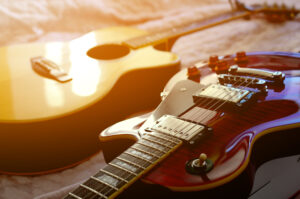 An iconic instrument with a rich history in rock n’ roll, the blues, and classical music, the guitar is one of the most popular instruments for first time music students to pick up and learn. Not to mention there are so many practical advantages to it! It’s portable, it can play almost anything short of a drum solo, and it’s been used on so many songs we know and love.
An iconic instrument with a rich history in rock n’ roll, the blues, and classical music, the guitar is one of the most popular instruments for first time music students to pick up and learn. Not to mention there are so many practical advantages to it! It’s portable, it can play almost anything short of a drum solo, and it’s been used on so many songs we know and love.
There is no time like the present to get started with guitar lessons in Atlanta. However, anyone who’s tried to purchase a guitar before can tell you there are thousands of options available that can easily overwhelm you. So where do you start?
Well, you should probably start with finding an Atlanta guitar teacher that can guide you in the right direction. Lessons in Your Home supplies quality teachers with amazing convenience for you or your family by teaching you either virtually or going right to your home.
The next thing you should do when in the market for a guitar is ask yourself specific questions that will help narrow down your range of choices.
What are my goals?
The first thing you have to ask yourself when you’re buying your first guitar is what your goals are in learning the instrument. Do you want to play fast solos like Van Halen? Or are you leaning more towards being a fingerstyle folk player?
Even if you don’t know the answer just yet, spending a little bit of time to consider what you want to get out of practicing guitar can help you pick the right guitar to fit your needs. For example, if you wanted to play like Jimi Hendrix, I would tell you to go for an electric guitar/amp combo. I wouldn’t tell you to buy a nylon string classical guitar!
What features do I want?
Most beginner guitars are relatively affordable, but some are not built to last. Be careful and do your research into the beginner guitar market.
If your goal is to buy a guitar that will last you a while, then I would aim for quality over affordability (Martin makes a fine line of beginner acoustics in that tier), but if you don’t want to break the bank on a big purchase, there’s nothing wrong with buying a less expensive beginner guitar to get your bearings.
You should also consider whether you need to buy any auxiliary equipment, such as amps, cables, new strings (most new guitars come already strung but sometimes you will need to go to a luthier to restring and “set up” a used guitar), and other equipment like straps, cases, and pedals. Are you also interested in recording your guitar? Then get ready for a whole other set of equipment to look out for!
Do I want an acoustic or an electric?
The more you play guitar, the more you’ll realize you might need many different kinds of guitars to get the job done. Since you’re just starting out, though, it doesn’t hurt to think about whether an acoustic or electric guitar would keep you interested and help you play the material you want to play.
Electrics typically use lighter string gauges and often have narrower necks than acoustics. You also start by using a pick on an electric. This might make an electric guitar easier for a beginner to play. On the other hand, acoustics are much more portable. You don’t need an amp to play them, and you can get a good, resonant tone out of an acoustic relatively fast.
There’s nothing quite like playing a few power chords through an amp on a nice electric, but there’s also nothing like playing blues on a steel string acoustic! Ultimately you will need to make your own decision. It will all depend on the style of music, comfort level, and priorities you have when practicing. If you’re still confused, ask your teacher before your first guitar lesson what they think might be the right choice for you.
Do I need a smaller guitar or full-scale guitar?
When you’re first learning the guitar, it’s important to play it as comfortably and relaxed as possible. Tension and straining during your practice time could create bad habits that you’ll have to reckon with later down the line.
More so than many other instruments, guitars can feel limiting to younger beginners due to their size and shape. If the guitar is too big or long, students will often resort to strange techniques like fretting with their thumb or playing on their lap in order to compensate for demands of playing the instrument. A smaller guitar can help these beginners just fine.
While you might correct your techniques over time, the last thing you want is to develop poor technique in the early stages of learning an instrument just because the instrument does not accommodate basic things like arm length or body size. If you’re uncomfortable on a full size guitar, it’s entirely acceptable to start on a 3/4th size guitar, regardless of age or style of music.
Find a Guitar Teacher Who’s Right for You
Still have questions about learning the guitar? Feel free to contact Lessons in Your Home to get set up with a teacher who’s a great fit for you or your child. Our teachers will come right to your home for every lesson, plus we offer virtual music lessons, too. However, our online music lessons are being taught by local music teachers with live lessons tailored to your child! Contact us today to learn more.
By Stephen Meisel
